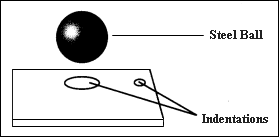Rockwell Hardness Testing of Plastics
The hardness testing of plastics is most often measured by the Rockwell hardness test or Shore (durometer) hardness test. Both methods measure the resistance of the plastic toward indentation, thereby providing an empirical hardness value. These hardness values do not necessarily correlate to other properties or fundamental characteristics. Rockwell hardness is generally chosen for 'harder' plastics such as nylon, polycarbonate, polystyrene, and acetal where the resiliency or creep of the polymer is less likely to affect the results. The Ball Indentation Hardness test (ISO 2039-1; DIN 53456) is used in Europe much more often than in North America. The Barcol hardness test is sometimes chosen for thermoset polymers. The figure below, from Mitsubishi Chemical Advanced Materials, shows the Rockwell hardness test geometry.
 ASTM D785:
A specimen of at least 1/4 inches (6.4 mm) thickness is indented by a steel ball. A small load is applied, the apparatus is zeroed, and then a larger load is applied and removed. After a short time with the preload still applied, the remaining indentation is read from the scale.
ASTM D785:
A specimen of at least 1/4 inches (6.4 mm) thickness is indented by a steel ball. A small load is applied, the apparatus is zeroed, and then a larger load is applied and removed. After a short time with the preload still applied, the remaining indentation is read from the scale.
The results obtained from this test are useful measures of relative resistance to indentation of various grades of plastics. However, the Rockwell hardness test does not serve well as a predictor of other properties such as strength or resistance to scratches, abrasion, or wear, and should not be used alone for product design specifications.
Different Rockwell hardness scales utilize different size steel balls and different loads. The three most common scales used for plastics are Rockwell E, Rockwell M, and Rockwell R; results reported from the Rockwell L scale are much rarer. Many other Rockwell hardness scales are used for metals, with Rockwell A, Rockwell B, and Rockwell C being the three most common. As seen in the charts below, the correlation between the Rockwell scales used for plastics is weak enough that attempts at conversion between the scales are discouraged.
The charts below are taken from data in MatWeb's database provided by polymer manufacturers for specific product grades.
Comparison of Rockwell Hardness Scales
Other hardness topics in MatWeb:
